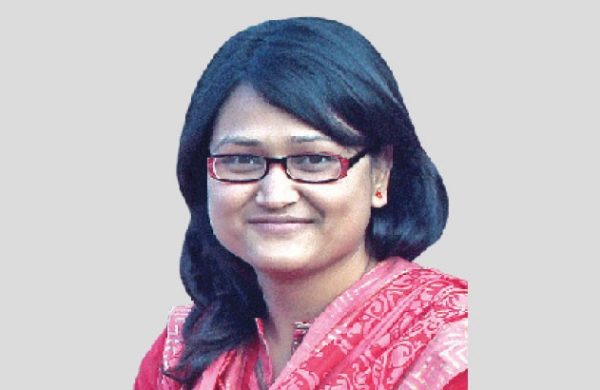Establishing Justice through Ethical Media Practices
- Update Time : Sunday, December 22, 2024

—Kaniz Kakon—
Media has an undeniable influence on shaping public discourse and societal norms, but in Bangladesh, its role in reporting gender-based violence often reflects deep-seated biases. When a 15-year-old girl Shefali (a pseudonym) was brutally assaulted in a small village, her personal details were widely publicised, exposing her to further trauma and societal judgment.
Meanwhile, the perpetrator, a well-connected man, remained shielded by vague descriptions. Such disparities in reporting highlight a troubling pattern where survivors are stigmatised, while perpetrators often evade accountability, exacerbating systemic inequalities. This biased reporting reflects patriarchal attitudes that reduce survivors to symbols of victimhood, stripping them of agency and dignity. Labels such as “dishonoured” or “tainted” perpetuate harmful stereotypes and reinforce cycles of stigma. Violating survivors’ privacy contradicts the principles of dignity and equality emphasised in international human rights frameworks like the Universal Declaration of Human Rights (UDHR) and the Convention on the Elimination of All Forms of Discrimination against Women (CEDAW). These failures underscore the need for the media to address systemic issues rather than sensationalising individual tragedies.
Anonymity often afforded to perpetrators further highlights a glaring double standard. Reports frequently humanise the accused by emphasising mitigating factors such as their age or societal contributions, subtly shifting focus away from the crime itself. This practice reflects a failure to interrogate the structural and cultural underpinnings of violence, making it harder to hold perpetrators accountable in both legal and societal contexts. Catharine MacKinnon’s critique of structural inequalities is particularly relevant, as it highlights how such narratives perpetuate male dominance and normalise systemic injustices.
Comparatively, countries like Sweden and Germany provide examples of more ethical approaches to reporting on gender-based violence. Swedish media adheres to strict guidelines that ensure survivors’ anonymity and focus on systemic failures rather than sensationalising individual cases. For instance, a high-profile assault case in Stockholm led to media coverage that emphasised gaps in the justice system, prompting public discourse and systemic reforms. Similarly, Germany has implemented ethical reporting practices where the focus is on institutional accountability, framing discussions around reforms to prevent future crimes. These examples demonstrate how ethical journalism can act as a powerful tool for advocacy and systemic change.
In Bangladesh, however, sensationalised reporting fosters a culture of silence and fear among survivors, where many hesitate to report crimes due to the stigma associated with public exposure. This undermines the effectiveness of legal frameworks and alienates victims from justice systems. Public exposure of survivors and a lack of focus on systemic issues perpetuate a cycle of violence and injustice, enabling systemic impunity where perpetrators exploit societal biases and power dynamics to evade accountability.
Addressing these challenges requires Bangladeshi media to adopt ethical guidelines that prioritise survivors’ rights and dignity. Anonymity for survivors must be non-negotiable, and journalists need training in gender-sensitive reporting to ensure their work contributes to advocacy and public awareness rather than harm. Ethical reporting frameworks, such as the “Social Responsibility Theory of the Press,” emphasise promoting the public good and challenging oppressive norms. Additionally, media outlets must prioritise investigative journalism that highlights systemic failures and institutional accountability, actively working to shift societal perceptions.
Media also has a vital role in fostering societal change. By shifting narratives to highlight resilience and justice while interrogating the inequalities that sustain such crimes, journalists can foster a more informed public discourse. Norwegian media, for instance, has used investigative journalism to expose gaps in legal protections for survivors, sparking national debates and leading to policy reforms. Similarly, South Korea’s #MeToo movement gained momentum through ethical media coverage that amplified survivors’ voices while holding institutions accountable. These examples underscore the transformative potential of responsible journalism in addressing societal inequalities. Collaboration between media, civil society, and policymakers is essential to develop robust frameworks that uphold human rights and promote gender justice. This collaboration should include comprehensive training programmes for journalists on ethical reporting and gender sensitivity, independent media watchdog organisations to ensure accountability and public awareness campaigns to reduce stigma and victim-blaming. Ethical reporting can amplify marginalised voices, challenge oppressive norms, and serve as a catalyst for systemic change, ensuring that the media not only informs but also transforms society, actively contributing to a culture rooted in equality and justice.
Imagine a garden overrun by weeds, choking the life out of the flowers struggling to bloom. Each weed represents a harmful societal norm or bias that has been left unchecked, stifling the growth of equality and justice. By adopting the measures outlined above, the media can act as the careful gardener—removing the weeds, enriching the soil with ethical practices, and ensuring that the garden of society flourishes. Stories of survivors could inspire hope and resilience, while investigative journalism could act as sunlight, illuminating the dark corners where injustice thrives. Together, these efforts could cultivate a new dimension of societal accountability and empathy, allowing not just the flowers to bloom, but the entire garden to thrive in harmony. As Benjamin Franklin once said, “Justice will not be served until those who are unaffected are as outraged as those who are.” This wisdom serves as a reminder that collective outrage and action, driven by ethical media practices, can uproot entrenched injustices and nurture a society where equality and justice are no longer ideals but realities.
_______________________________________
The writer is an Assistant Professor in the Department of Philosophy at IUBAT and pursuing a Masters in Human Rights and Multiculturalism at University of South Eastern Norway.


















